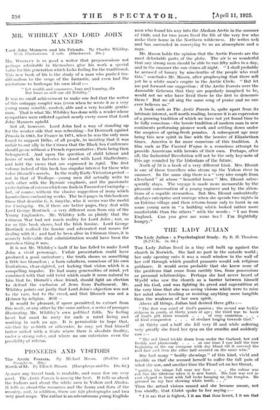MR. WHIBLE Y AND LORD JOHN TANNERS
Lord John Manners and his Friends. By Charles Whibley. With Illustrations. 2 vols. (Blackwood. 30s.) MIL WHIBLET is so good a writer that prepossessions not perhaps admirable in themselves give his work a special value for this generation which lacks feeling for the traditional. This new book of his is the study of a man who pushed tra- ditionalism to the verge of the fantastic, and even had the misfortune to burlesque his own ideal :- " Let wealth and commerce, laws and learning, dia But leave us still our old Nobility."
It was no small achievement to make one feel that the writer of this unhappy couplet was (even when he wrote it as a very young man) sensible, modest, able and a very lovable gentle- man. That is what Mr. Whibley has done with a reader whose sympathies were enlisted against nearly every cause that Lord John Manners upheld.
Not all, however. Lord John had a way of standing up for the weaker side that was refreshing—for Denmark against Prussia in 1864, for France in 1871, when he was the only man found to support Dilke, of all people, in insisting that it was unfair to our ally in the Crimea that the Black Sea Conference should go on without a French representative : Paris being then beleaguered. And upon the question of child labour and hours of work in factories he stood with Lord Shaftesbury, and held the views that are expressed in Sybil. The first volume indeed of this book has singular interest for those who value Disraeli's novels. In the really Early-Victorian period— not in that of Trollope—young men did actually write to each other with the Byronic emphasis, and the passionate protestat ion of esteem which one finds in Tancred or Coningsby- but, of course, without the elusive suggestion of irony which haunts those enchanting works. The best pages in this book are those that describe G. S. Smythe, who it seems was the model for Coningsby. Or, if there are better pages, they deal with Lord George Bentinck—a very different man from any of the Young Englanders. Mr. Whibley tells us plainly that the Crimean War had not much reality for Lord John ; nor, so far as this book shows, had the Irish famine. Lord George )3entinck realised the famine and advocated real means for dealing with it ; and had he been alive in Crimean times, it is scarcely believable that administration would have been the nerveless thing it was.
It is not Mr. Whibley's fault if he has failed to make Lord John a vivid personage. Unfair presentation could have produced a good caricature ; the truth shows us something a little too blameless ; a born subaltern, conscious of his own limitations, clear-sighted, yet lacking that vision which is a compelling impulse. lie had many generosities of mind, yet Combined with that odd twist which made it seem natural to him that he, Disraeli's close friend, should fight an election to defend the exclusion of Jews from Parliament. Mr. Whibley points out justly that Lord John's objection was not to the race, but to the creed, and that Disraeli was not a Hebrew by religion. Still—
It would be pleasant; if space permitted, to extract from this work, or any other by the same author, a series of passages illustrating Mr. Whibley's own political faith. No feeling heart but must be sorry for such a mind living and working in such an age. It is permissible to hope that, whether by re-birth or otherwise, he may yet find himself better suited with a State where there is absolute finality, under a strong ruler, and where no one entertains even the possibility of reform.










































 Previous page
Previous page